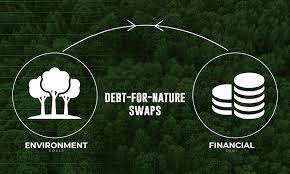DEBT-FOR-NATURE SWAP
Why in News:
Recently, Gabon announced a $500 million debt-for-nature swap which is the largest such deal signed by any country.
Important Points:
- Under the debt-for-nature swap, Gabon has agreed to a deal with the Bank of America, the US International Development Finance Corporation (USDFC) and The Nature Conservancy (TNC), to refinance $500 million in national debt toward marine conservation efforts in the country.
- Gabon’s debt has been restructured under a Blue Bond in the world’s second-largest debt-for-nature swap.
- In May 2023, the world’s first and largest debt swap to conserve oceans was signed by Ecuador. The country had exchanged $1.6 billion denominated bonds for a new $656 million loan.
- This is the fourth project under TNC’s “Blue Bonds for Ocean Conservation” strategy. Gabon is the fourth country to partner with TNC on a Blue Bonds project after Seychelles, Belize and Barbados.
- In March 2023, the high-seas treaty agreed upon by the world offered an opportunity to protect 30 per cent of the world’s oceans and lands by 2030.
Debt-for-nature swap:
- It allows heavily indebted developing countries to seek help from financial institutions in the developed world with paying off their debt if they agree to spend on conservation of natural resources.
- Usually banks in developed countries buy the debts of such counties and replace them with new loans which mature later. These have lower interest rates.
- The notion of debt-for-nature swaps was first mooted in 1984 by Thomas Lovejoy, the former vice-president for science at the World Wildlife Fund-US, in response to the Latin American debt crisis.
- The first debt-for-nature swap was a third-party deal facilitated by Conservation International.
- Finalised in 1987, it involved foreign creditors agreeing forgive USD 650,000 of Bolivia’s debt in exchange for the country setting aside 1.5 million hectares in the Amazon Basin for conservation efforts.
Benefits:
- Debt-for-climate swaps provide benefits for both creditors and debtors.
- Creditors can advance their development cooperation and climate finance goals, improve their chances of debt recovery, and strengthen their diplomatic ties with debtor nations.
- Debtors can reduce their external debt and debt service obligations, allocate fiscal resources towards other development priorities, promote climate action through domestic investment.
Blue Bonds:
- Blue bonds work in the same way than traditional bonds but are different in that the entities issuing them are determined to use the resources generated – or a large proportion thereof – for the protection and conservation of marine ecosystems.
- Blue Bonds for Ocean Conservation presents an opportunity for island and coastal nations to reinvest in their natural resources.
- Blue Bonds for Ocean Conservation is one of TNC’s most innovative solutions, supporting island and coastal nations to use debt solutions to create long-term sustainable financing that can help protect 30% of our global ocean while achieving sustainable economic development and adapting to climate change.
- In doing so, TNC is leveraging philanthropy to catalyze investments for nature and people, improving more than 4 million square kilometers of ocean—helping governments unlock funds to deliver on their conservation goals and ultimately support the well-being of their communities.
How Blue Bonds Works?:
1. Conservation Commitments: Governments are committed to protecting approximately 30% of their ocean areas in alignment with global conservation goals.
2. Marine Spatial Planning: TNC works with stakeholders to identify activities that combine conservation and sustainable economic opportunities, such as restoring coral reefs for tourism and improving fisheries management.
3. Unlocking Sustainable Finance: Working with partners, TNC helps refinance countries’ national debt, often purchasing the debt at a discount and refinancing it with better interest rates and/or longer repayment terms.




.jpg)


.jpg)
.jpg)





